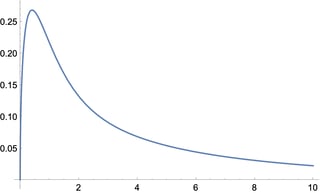Using v 13.01 or 13.1: bug in integrate, see accepted answer below.
First off, the distribution Simplify[PDF[GammaDistribution[a, 1/b], x], Assumptions -> b > 0]
$$\begin{array}{cc}
\Bigg\{ &
\begin{array}{cc}
\dfrac{b^a x^{a-1} e^{-b x}}{\Gamma (a)} & x>0 \\
0 & \text{True} \\
\end{array}\;\;,
\\
\end{array}$$
which is an alternative form of the gamma distribution, when convolved with the same function but with parameters $\alpha$ and $\beta$ yields $$\text{Gdc}=\begin{array}{cc}
\Bigg\{ &
\begin{array}{cc}
\dfrac{b^a \beta ^{\alpha } e^{b (-x)} x^{a+\alpha -1} \, _1F_1(\alpha ;a+\alpha ;x (b-\beta ))}{\Gamma (a+\alpha )} & x>0 \\
0 & \text{True} \\
\end{array}
\\
\end{array}\;\;,$$
where $_1F_1$ is Hypergeometric1F1. For documentation and application of the Gdc density function see https://ejnmmiphys.springeropen.com/articles/10.1186/s40658-016-0166-z
In case someone wants to try this I have replaced $\alpha$ and $\beta$ that do not render well on this site with A and B here (x^(-1+a+A) b^a E^(-x b) B^A Hypergeometric1F1[A,a+A,x (b-B)])/Gamma[a+A].
Next, please recall that the mean value of a convolution of two density functions is the sum of the mean values of each function (provided they exist), https://stats.stackexchange.com/q/342023/99274, or for this parameterization as each mean takes the form $\alpha\,/\beta$ (see https://en.wikipedia.org/wiki/Gamma_distribution),
$$\bar{x}=\dfrac{a}{b}+\dfrac{\alpha}{\beta}\;\;.$$
Couldn't be simpler, right? However, if we define $$\text{Gdc}=\text{ProbabilityDistribution}\left[
\begin{array}{cc}
\Bigg\{ &
\begin{array}{cc}
\frac{x^{a+\alpha -1} b^a e^{-x b} \beta ^{\alpha } \, _1F_1(\alpha ;a+\alpha ;x (b-\beta ))}{\Gamma (a+\alpha )} & x>0 \\
0 & \text{True} \\
\end{array}
\\
\end{array}
,\{x,0,\infty \},\text{Assumptions}\to \{a>0,b>0,\alpha >0,\beta >0,b>\beta ,x\in \mathbb{R},a\in \mathbb{R},b\in \mathbb{R},\alpha \in \mathbb{R},\beta \in \mathbb{R}\}\right]\;\;,$$
where $b>\beta$ without loss of generality, and then ask for Mean[Gdc] without assigning values to the parameters we get of all things $$\frac{(-1)^{-\alpha } \cos (\pi \alpha ) (a \beta +\alpha b)}{b \beta }\;\;,$$
which is obviously incorrect as the mean value of definite positive values, as required to define a density, can be neither complex valued nor negative.
However, if we put in values for the parameters of $\left(a=1;b=1;\alpha =\frac{1}{2};\beta =\frac{1}{10};\right)$, which, when plotted Plot[PDF[Gdc,x],{x,0,10},PlotRange->Full] looks like

we get the correct values of 6 for both Mean[Gdc] and $\dfrac{a}{b}+\dfrac{\alpha }{\beta }$,
but 0 for
$$\dfrac{(-1)^{-\alpha } \cos (\pi \alpha ) (a \beta +\alpha b) }{b \beta }$$
So, obviously, something is wrong, but what? This looks like a bug of some sort. Any insight into what this means would be helpful, in particular, I would like to be able to attempt using FindDistributionParameters and am uncertain what I would be getting from that.
Note As pointed out by @JimB in his comment below, when $\alpha$ is exactly a positive integer, then and only then does
$$\frac{(-1)^{-\alpha } \cos (\pi \alpha ) (a \beta +\alpha b)}{b \beta }=\dfrac{a}{b}+\dfrac{\alpha}{\beta}\iff\alpha\in\mathbb{Z}^+\;,$$ which is vanishingly improbable for a real valued function.




mean = Assuming[a > 0 && b > 0 && α > 0 && β > 0 && b > β, Integrate[x PDF[Gdc, x], {x, 0, Infinity}]] // Expandgives the expected result. $\endgroup$FullSimplify[(E^(-2 I \[Pi] \[Alpha]) (b \[Alpha] + a \[Beta]))/(b \[Beta]), Assumptions -> \[Alpha] \[Element] Integers]. $\endgroup$